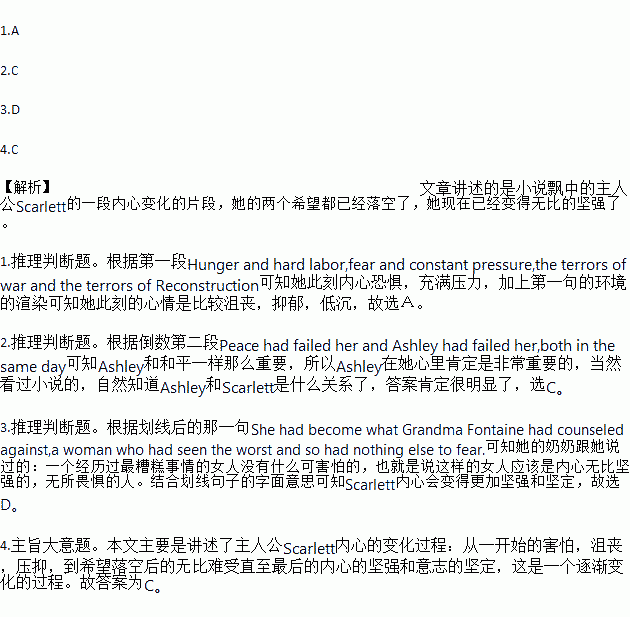题目内容
In the dull twilight of the winter afternoon,Scarlett came to the end of the long road which had begun the night Atlanta fell.She had set her feet upon that road as a spoiled,selfish and untried girl,full of youth,warm of emotion, easily confused by life.Now,at the end of the road,there was nothing left of that girl.Hunger and hard labor,fear and constant pressure,the terrors of war and the terrors of Reconstruction had taken away all warmth and youth and softness.Around the core of her being,a shell of hardness had formed and,little by little,layer by layer,the shell had thickened during the endless months.
But until this very day,two hopes had been left to support her.She had hoped that the war being over,life would gradually return to its old face.She had hoped that Ashley's return would bring back some meaning into life.Now both hopes were gone.She realized that for her,for the whale South,the war would never end.The bitterest fighting, the most violent and cruel revenges,were just beginning.And Ashley was imprisoned forever by words which were stronger than any jail.
Peace had failed her and Ashley had failed her,both in the same day,and it was as if the last crevice(裂口)in the shell had been closed,the final layer hardened.She had become what Grandma Fontaine had counseled against,a woman who had seen the worst and so had nothing else to fear.Not life nor Mother nor loss of love nor public opinion.Only hunger and her nightmare dream of hunger could make her afraid.
A curious sense of lightness,of freedom,went through her now that she had finally hardened her heart against everything that tied her to the old days and the old Scarlett.She had made her decision and,thank God,she wasn't afraid.She had nothing to lose and her mind was made up.
1.Which of the following adjectives best describe the mood in the first paragraph?
A. Gloomy and depressed. B. Cheerful and relaxed.
C. Peaceful and calm. D. Nervous and anxious.
2.What can be inferred from the passage?
A. Scarlett believed that the war would end soon.
B. Scarlett felt hopeless about the future when the war broke out.
C. Ashley may have been an important person to Scarlett.
D. Grandma Fontaine had advised Scarlett to be fearless.
3.What does the underlined sentence "...and it was as if the last crevice in the shell had been closed,the final layer hardened" suggest?
A. Scarlett would shut herself off from others.
B. Scarlett would refuse to face the reality.
C. Scarlett.would be trapped in a state of desperation.
D. Scarlett would grow mentally tougher and more determined.
4.Which of the following best summarizes the main idea of the passage?
A. It mainly describes the hopes and fear of Scarlett after Atlanta fell.
B. It mainly describes the destructive impact of the war on Scarlett's life.
C. It mainly describes the gradual change of Scarlett's feelings and attitude.
D. It mainly describes the sufferings of people in the South during the w:u:


 C. fortunately D. actually
C. fortunately D. actually New means of communication technology such as television and the Internet spread English worldwide. 4. In addition, they could use the Internet for information, business, or e-mail communication, all in English. Just as the use of English spread, other languages changed English by contact or by new inventions and technology.
New means of communication technology such as television and the Internet spread English worldwide. 4. In addition, they could use the Internet for information, business, or e-mail communication, all in English. Just as the use of English spread, other languages changed English by contact or by new inventions and technology.